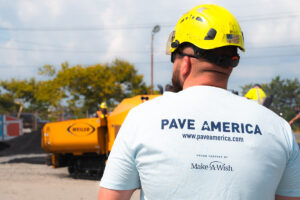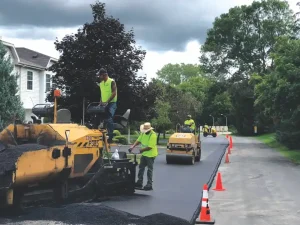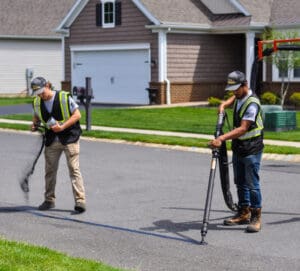There are essentially two options when going for asphalt paving – hot or cold mix asphalt. But what’s the difference between them? Which one should you go for? Are there situations where one is more suitable? In this article, we’ll address these questions and offer more insights into hot mix asphalt patches vs cold mix.
Hot Mix Asphalt
If you’ve ever witnessed a crew on a road tearing up and installing new asphalt and noticed steam coming off the freshly poured asphalt, you already have an idea of what hot mix asphalt is about.
It combines sand, grave, and asphalt cement, an aggregate that’s heated to a temperature of 150-200oC before application. Hot mix asphalt is commonly used in large-scale projects such as roads, parking lots, or driveways.
Pros
- Hot mix asphalt is relatively stronger and more durable which is why it’s preferred for large-scale and high-traffic roads and highways. This is because when the mixture is heated, materials become more pliable, making them adhere to the surface better.
- It offers a great deal of flexibility and malleability, giving it the ability to shrink and expand with temperature changes without cracks or damage.
- Asphalt has a reputation for withstanding all types of weather. So hot mix asphalt can survive extreme flooding, wind, cold seasons, and more.
Cons
- Hot mix asphalt requires specialized equipment for mixing and heating the aggregate. Some of the equipment can be costly excluding the cost of their operators.
- Because of the equipment and professionals to operate them, hot mix asphalt paving is a considerably more expensive option.
- It’s hazardous to work with a hot aggregate of temperatures of up to 200oC. Unless you’re careful and have protective gear, the risk of injury is pretty high. S
Cold Mix Asphalt
Cold mix asphalt combines emulsified or cutback asphalts, aggregate, and water and does not require heating. So, the mixture can be applied to the surface straight from the bag without the use of heavy equipment.
Cold mix asphalt is common and has a wide range of applications in cold patch repair projects such as small cracks, potholes, and patches. It is also useful in preventing minor damages from spreading and turning into large cracks and potholes.
Pros
- Cold mix asphalt is a lot more affordable than hot mix asphalt since it requires no heavy equipment and less effort to install
- Installing cold asphalt doesn’t require specialized knowledge and skills. All it takes is pouring the mixture into the pothole or crack and level it off, something anyone can do.
- Cold mix asphalt is the perfect short-term solution. When the temperature conditions aren’t right for hot mix asphalt, cold mix asphalt becomes a great alternative.
Cons
- Unfortunately, cold mix asphalt isn’t a long-term solution. Despite being more affordable, it’s only good for temporary fixes.
- It is also not as strong as hot mix asphalt making it unideal for major projects such as highways or high-traffic roads.
Choosing Between Hot and Cold Mix Asphalt
Having gone through the basics of each and their unique set of advantages and disadvantages, the decision on which to go becomes easier, but then it depends on certain factors.
For instance, if you want something more durable and stronger, hot mix asphalt is an excellent choice. But if you just want to fix a patch or a pothole, there’s no need to spend excessively on hot mix asphalt. In other words, the depends on what you want you to want to achieve and/or your budget.
Let Pro-Pave Can Help
Proper and quality asphalt paving is demanding and thus requires a highly trained and resourced specialist. The mixture has to be right, the temperature accurate, the right machinery used, and outstanding expertise to get it right. Fortunately, Pro-Pave, Inc. is a premier commercial concrete and asphalt paving company serving a wide range of customers. We can take care of all your asphalt paving needs.
Check our service page for more information or call us at (703)-433-9500 for a free consultation.



